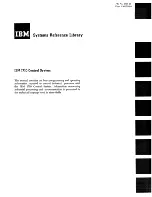
ENGINEERING MANUAL OF AUTOMATIC CONTROL
CONTROL FUNDAMENTALS
5
INTRODUCTION
This section describes heating, ventilating, and air
conditioning (HVAC) systems and discusses characteristics and
components of automatic control systems. Cross-references are
made to sections that provide more detailed information.
A correctly designed HVAC control system can provide a
comfortable environment for occupants, optimize energy cost
and consumption, improve employee productivity, facilitate
efficient manufacturing, control smoke in the event of a fire,
and support the operation of computer and telecommunications
equipment. Controls are essential to the proper operation of
the system and should be considered as early in the design
process as possible.
Properly applied automatic controls ensure that a correctly
designed HVAC system will maintain a comfortable
environment and perform economically under a wide range of
operating conditions. Automatic controls regulate HVAC system
output in response to varying indoor and outdoor conditions to
maintain general comfort conditions in office areas and provide
narrow temperature and humidity limits where required in
production areas for product quality.
Automatic controls can optimize HVAC system operation.
They can adjust temperatures and pressures automatically to
reduce demand when spaces are unoccupied and regulate
heating and cooling to provide comfort conditions while limiting
energy usage. Limit controls ensure safe operation of HVAC
system equipment and prevent injury to personnel and damage
to the system. Examples of limit controls are low-limit
temperature controllers which help prevent water coils or heat
exchangers from freezing and flow sensors for safe operation
of some equipment (e.g., chillers). In the event of a fire,
controlled air distribution can provide smoke-free evacuation
passages, and smoke detection in ducts can close dampers to
prevent the spread of smoke and toxic gases.
HVAC control systems can also be integrated with security
access control systems, fire alarm systems, lighting control
systems, and building and facility management systems to
further optimize building comfort, safety, and efficiency.
DEFINITIONS
The following terms are used in this manual. Figure 1 at the
end of this list illustrates a typical control loop with the
components identified using terms from this list.
Analog: Continuously variable (e.g., a faucet controlling water
from off to full flow).
Automatic control system: A system that reacts to a change or
imbalance in the variable it controls by adjusting other
variables to restore the system to the desired balance.
Algorithm: A calculation method that produces a control output
by operating on an error signal or a time series of error
signals.
Compensation control: A process of automatically adjusting
the setpoint of a given controller to compensate for
changes in a second measured variable (e.g., outdoor
air temperature). For example, the hot deck setpoint
is normally reset upward as the outdoor air temperature
decreases. Also called “reset control”.
Control agent: The medium in which the manipulated variable
exists. In a steam heating system, the control agent is
the steam and the manipulated variable is the flow of
the steam.
Control point: The actual value of the controlled variable
(setpoint plus or minus offset).
Controlled medium: The medium in which the controlled
variable exists. In a space temperature control system,
the controlled variable is the space temperature and
the controlled medium is the air within the space.
Controlled Variable: The quantity or condition that is measured
and controlled.
Controller: A device that senses changes in the controlled
variable (or receives input from a remote sensor) and
derives the proper correction output.
Corrective action: Control action that results in a change of
the manipulated variable. Initiated when the controlled
variable deviates from setpoint.
Cycle: One complete execution of a repeatable process. In basic
heating operation, a cycle comprises one on period
and one off period in a two-position control system.
Cycling: A periodic change in the controlled variable from one
value to another. Out-of-control analog cycling is
called “hunting”. Too frequent on-off cycling is called
“short cycling”. Short cycling can harm electric
motors, fans, and compressors.
Cycling rate: The number of cycles completed per time unit,
typically cycles per hour for a heating or cooling system.
The inverse of the length of the period of the cycle.
Summary of Contents for AUTOMATIC CONTROL SI Edition
Page 1: ...AUTOMATIC CONTROL for ENGINEERING MANUAL of COMMERCIAL BUILDINGS SI Edition ...
Page 4: ...ENGINEERING MANUAL OF AUTOMATIC CONTROL iv ...
Page 6: ...ENGINEERING MANUAL OF AUTOMATIC CONTROL vi ...
Page 46: ...ENGINEERING MANUAL OF AUTOMATIC CONTROL CONTROL FUNDAMENTALS 36 ...
Page 66: ...ENGINEERING MANUAL OF AUTOMATIC CONTROL PSYCHROMETRIC CHART FUNDAMENTALS 56 ...
Page 128: ...ENGINEERING MANUAL OF AUTOMATIC CONTROL ELECTRIC CONTROL FUNDAMENTALS 118 ...
Page 158: ...MICROPROCESSOR BASED DDC FUNDAMENTALS 148 ENGINEERING MANUAL OF AUTOMATIC CONTROL ...
Page 208: ...ENGINEERING MANUAL OF AUTOMATIC CONTROL BUILDING MANAGEMENT SYSTEM FUNDAMENTALS 198 ...
Page 493: ...INDEX ENGINEERING MANUAL OF AUTOMATIC CONTROL 483 INDEX ...
Page 506: ...ENGINEERING MANUAL OF AUTOMATIC CONTROL INDEX 496 NOTES ...
Page 507: ...INDEX ENGINEERING MANUAL OF AUTOMATIC CONTROL 497 NOTES ...
Page 508: ...ENGINEERING MANUAL OF AUTOMATIC CONTROL INDEX 498 NOTES ...
Page 509: ...INDEX ENGINEERING MANUAL OF AUTOMATIC CONTROL 499 NOTES ...
Page 510: ...ENGINEERING MANUAL OF AUTOMATIC CONTROL INDEX 500 NOTES ...
Page 511: ...INDEX ENGINEERING MANUAL OF AUTOMATIC CONTROL 501 NOTES ...
Page 512: ...ENGINEERING MANUAL OF AUTOMATIC CONTROL INDEX 502 NOTES ...
















































